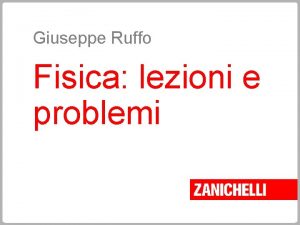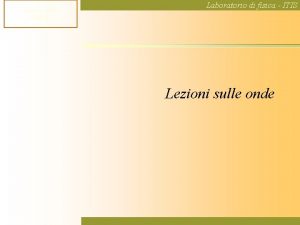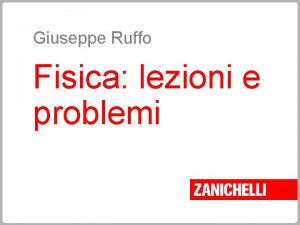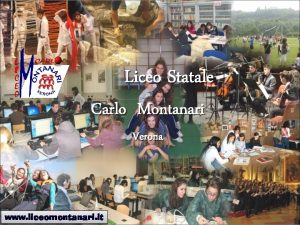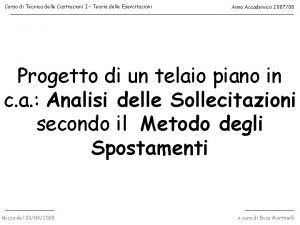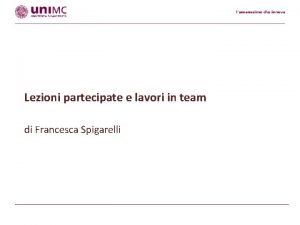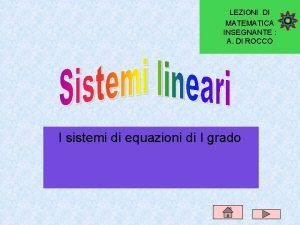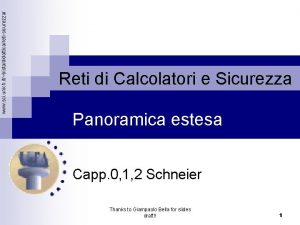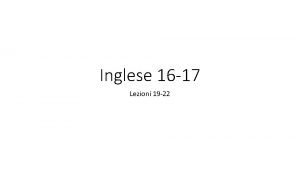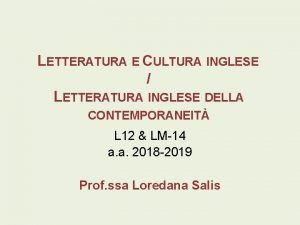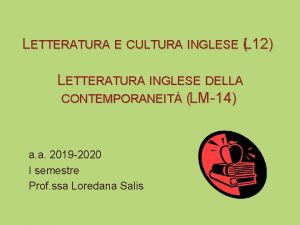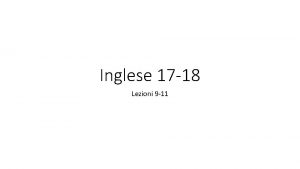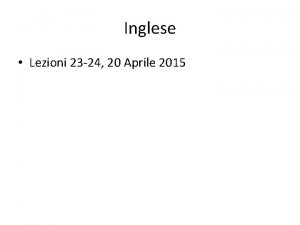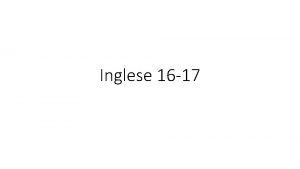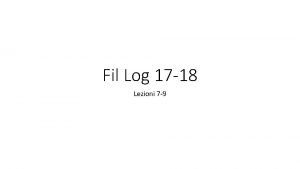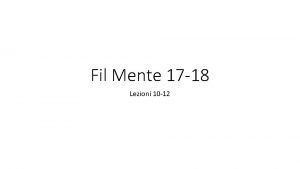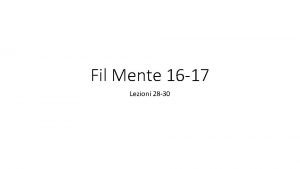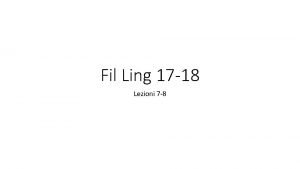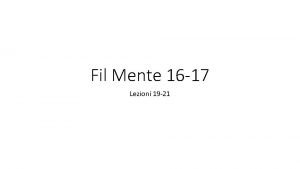Inglese 16 17 Lezioni 26 28 Lezioni 26







![1. The infinite divisibility of our ideas of space and time […] Everyone agrees—and 1. The infinite divisibility of our ideas of space and time […] Everyone agrees—and](https://slidetodoc.com/presentation_image_h2/13451ded316e6602cc94b3be8f04f089/image-8.jpg)

![3. The other qualities of our ideas of space and time […] impressions always 3. The other qualities of our ideas of space and time […] impressions always](https://slidetodoc.com/presentation_image_h2/13451ded316e6602cc94b3be8f04f089/image-10.jpg)


![5. The same subject continued […] As for the doctrine that time is nothing 5. The same subject continued […] As for the doctrine that time is nothing](https://slidetodoc.com/presentation_image_h2/13451ded316e6602cc94b3be8f04f089/image-13.jpg)

- Slides: 14

Inglese 16 -17 Lezioni 26 -28

• Lezioni 26 -27 • 5/12/16

Calendario • Lunedì 5 Dicembre: Diana - Laura; Hobbes, De corpore, parti scelte per esporre l'esempio topico della nave di Teseo; Martedì 6 Dicembre: Paolo - Federica; Hume, A Treatise of Human Nature, parti scelte per l'analisi della concezione humiana del tempo; • Roberto - Helvio; Hume, A Treatise of Human Nature, appendice sul sé; • • Lunedì 12 Dicembre: Anna - Erica; Butler, The Analogy of Religion, argomento ancora da delineare; • • Marika - Angela; Russel, opera ed argomento ancora da delineare. •

• Diana – Laura: • Hobbes, De corpore, parti scelte per esporre l'esempio topico della nave di Teseo • Ho messo nel sito i passi letti in classe

• Russell su knowledge by acquaintance e knowledge by description

• Lezione 28 • 6/12/16 • Paolo - Federica; Hume, A Treatise of Human Nature, parti scelte per l'analisi della concezione humiana del tempo; • Roberto - Helvio; Hume, A Treatise of Human Nature, appendice sul sé;

D. HUME, TREATISE OF HUMAN NATURE Part ii: The ideas of space and time Paolo Ferracuti e Federica Pancotti
![1 The infinite divisibility of our ideas of space and time Everyone agreesand 1. The infinite divisibility of our ideas of space and time […] Everyone agrees—and](https://slidetodoc.com/presentation_image_h2/13451ded316e6602cc94b3be8f04f089/image-8.jpg)
1. The infinite divisibility of our ideas of space and time […] Everyone agrees—and the plainest observation and experience makes it obvious—that the capacity of the mind is limited, and can never attain a full and adequate conception of infinity. It is also obvious that whatever is capable of being divided in infinitum must consist of an infinite number of parts: if you limit the number of parts, you thereby limit the ·possible· division. It doesn’t take much work to conclude from this that the idea we form of any finite quality is not infinitely divisible, and that by proper distinctions and separations we can reduce it to lesser ideas that are perfectly simple [= ‘without parts’] and indivisible. In denying that the mind’s capacity is infinite we are supposing that it will come to an end in the division of its ideas; and there is no possible escape from this conclusion. […]

2. The infinite divisibility of space and time When ideas adequately represent objects, the relations, contradictions, and agreements among the ideas all hold also among the objects; and we can see this to be the general foundation of all human knowledge. […] The plain consequence, to be drawn with no shuffling or dodging, is that whatever appears impossible and contradictory in relation to these • ideas must be really impossible and contradictory ·in relation to the • things·. […] if • it is a contradiction to suppose that a finite thing contains an infinite number of parts, then • no finitely extended thing can be infinitely divisible. […] A property of time that it cannot lose—it is in a way time’s essence—is that its parts come in succession, and that no two of them, however close, can exist together. […] This makes it certain that time, because it exists, must be composed of indivisible moments.
![3 The other qualities of our ideas of space and time impressions always 3. The other qualities of our ideas of space and time […] impressions always](https://slidetodoc.com/presentation_image_h2/13451ded316e6602cc94b3be8f04f089/image-10.jpg)
3. The other qualities of our ideas of space and time […] impressions always precede ideas, and every ·simple· idea that comes into the imagination first makes its appearance in a corresponding impression. […] • the idea of extension is nothing but • a copy of these coloured points and of the manner of their appearance. […] The idea of time is derived from the succession of our perceptions of every kind—ideas as well as impressions, and impressions of reflection as well as of sensation. […] As we receive the idea of space from the layout of visible and tangible objects, so we form the idea of time from the succession of ideas and impressions ·in our minds·. Time cannot all on its own make its appearance or be taken notice of by the mind.

A great philosopher (Mr Locke) has remarked that our perceptions have certain limits in this respect— limits that are fixed by the basic nature and constitution of the mind— beyond which no influence of external objects on the senses can ever speed up our thought or slow it down. If you quickly whirl around a burning coal, it will present to the senses an image of a circle of fire, and there won’t seem to be any interval of time between its revolutions. That is simply because our perceptions can’t succeed each other as quickly as motion can be communicated to external objects. When we have no successive perceptions, we have no notion of time, even though there is a real succession in the objects—·as when in a single circling of the burning coal, the second quarter of the journey follows the first quarter·. From these phenomena, as well as from many others, we can conclude that time can’t make its appearance to the mind • alone or • accompanied by a steady unchanging object, but is always revealed by some perceivable succession of changing objects.

Now as time is composed of parts that don’t coexist, an unchanging object, since it produces only coexistent impressions, produces none that can give us the idea of time; and consequently that idea must be derived from a succession of changing objects, and time in its first appearance can never be separated from such a succession. […] The idea of time is not derived from a particular impression mixed up with others and plainly distinguishable from them; its whole source is the manner in which impressions appear to the mind—it isn’t one of them. Five notes played on a flute give us the impression and idea of time, but time is not a sixth impression that presents itself to the hearing or to any other of the senses. […] All the mind does in this case is to notice the manner in which the different sounds make their appearance, and ·to have thought· that it could afterwards think of it as the manner in which other things—·other than the five flute-notes·—might appear. ·For the mind to have the idea of time·, it must certainly have the ideas of some objects [here = ‘events’], for without these it could never arrive at any conception of time. Time doesn’t appear as a primary distinct impression, so it has to consist in different ideas or impressions or objects disposed in a certain manner—the manner that consists in their succeeding each other. […]
![5 The same subject continued As for the doctrine that time is nothing 5. The same subject continued […] As for the doctrine that time is nothing](https://slidetodoc.com/presentation_image_h2/13451ded316e6602cc94b3be8f04f089/image-13.jpg)
5. The same subject continued […] As for the doctrine that time is nothing but the manner in which some real objects ·or events· exist: this is open to the same objections as the similar doctrine regarding extension. If our disputing and reasoning about • ·spatial· vacuum is a sufficient proof that we have the idea of it, we must for the same reason have the idea of time when nothing happens—·that is, of • temporal vacuum·—because there is no commoner subject of dispute. But it is certain that we really don’t have any such idea. For where could it come from? Does it arise from an impression of sensation or of reflection? Point the sourceimpression out distinctly to us, so that we can know its nature and qualities! But if you can’t point out any such impression you may be certain that you are mistaken in thinking you have any such idea. But although it is impossible to show an impression from which an idea of time without something that changes could be derived, we can easily point out the appearances that make us fancy we have that idea. We may observe that there is a continual succession of perceptions in our mind, so that the idea of time is always present to us; and when we consider an unchanging object at five o’clock and then again at six • we are apt to apply our idea of time to it in the same way as if the object had been moving or altering throughout.

The first and second appearances of the object, being compared with the succession of our perceptions, seem as far apart ·in time· as if the object had really altered. To this we may add, what experience shows us, • that between these appearances the object was capable of such a number of changes ·as we fictionally imagine it to have undergone·; as • also that the unchanging or rather fictitious duration has the same effect on every quality increasing or lessening it—as does the succession that is ·real, because it is· obvious to the senses. Because of these three relations we are apt to confound our ideas, and imagine we can form the idea of a time and duration without any change or succession.
 Lezioni di statistica descrittiva
Lezioni di statistica descrittiva Velocita angolare
Velocita angolare Vie metaboliche cicliche
Vie metaboliche cicliche Liceo galilei dolo
Liceo galilei dolo Liceo scientifico galileo galilei dolo
Liceo scientifico galileo galilei dolo Accelerazione negativa
Accelerazione negativa Fisica: lezioni e problemi 1 soluzioni
Fisica: lezioni e problemi 1 soluzioni Lezioni di fisica sulle onde
Lezioni di fisica sulle onde Spinta di archimede formula
Spinta di archimede formula Montanari liceo
Montanari liceo Lezioni di tecnica delle costruzioni
Lezioni di tecnica delle costruzioni Forza di attrito
Forza di attrito Lezioni partecipate
Lezioni partecipate Sistema determinato indeterminato impossibile
Sistema determinato indeterminato impossibile Lezioni online unich
Lezioni online unich





